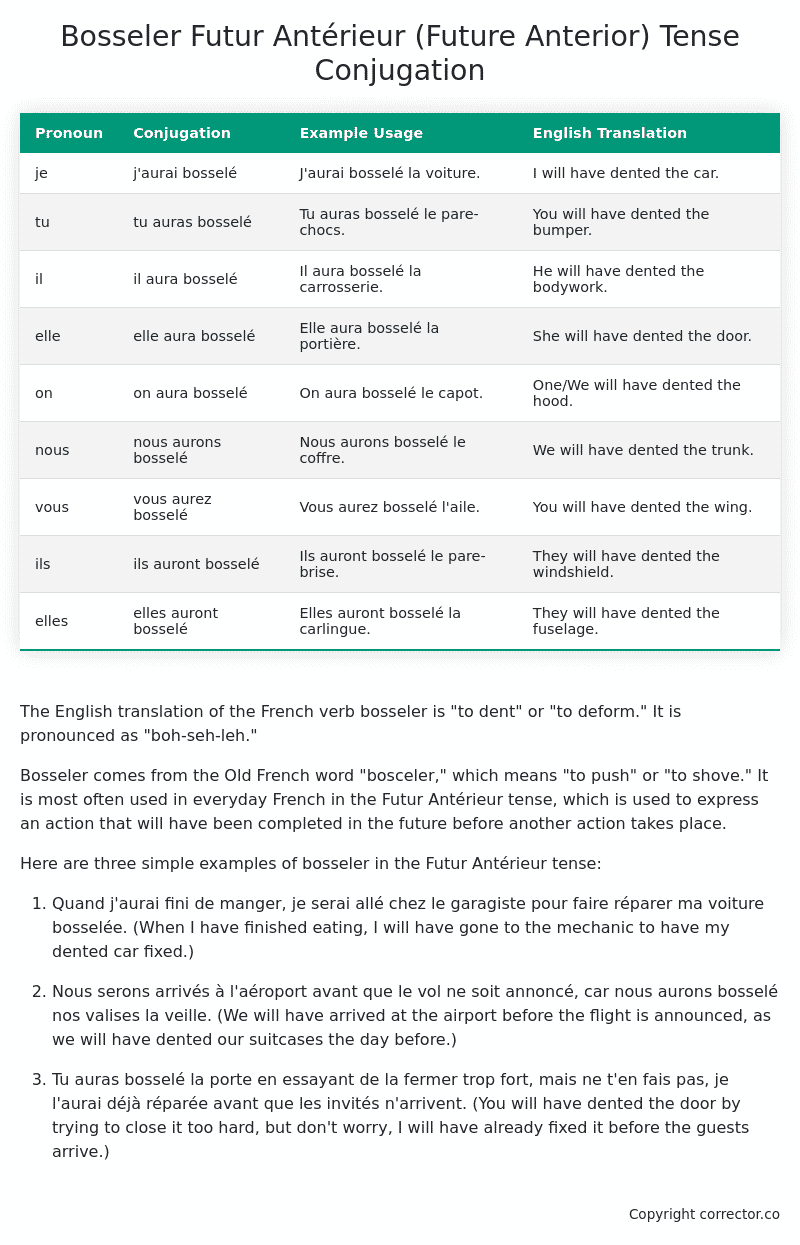Futur Antérieur (Future Anterior) Tense Conjugation of the French Verb bosseler
Introduction to the verb bosseler
The English translation of the French verb bosseler is “to dent” or “to deform.” It is pronounced as “boh-seh-leh.”
Bosseler comes from the Old French word “bosceler,” which means “to push” or “to shove.” It is most often used in everyday French in the Futur Antérieur tense, which is used to express an action that will have been completed in the future before another action takes place.
Here are three simple examples of bosseler in the Futur Antérieur tense:
-
Quand j’aurai fini de manger, je serai allé chez le garagiste pour faire réparer ma voiture bosselée. (When I have finished eating, I will have gone to the mechanic to have my dented car fixed.)
-
Nous serons arrivés à l’aéroport avant que le vol ne soit annoncé, car nous aurons bosselé nos valises la veille. (We will have arrived at the airport before the flight is announced, as we will have dented our suitcases the day before.)
-
Tu auras bosselé la porte en essayant de la fermer trop fort, mais ne t’en fais pas, je l’aurai déjà réparée avant que les invités n’arrivent. (You will have dented the door by trying to close it too hard, but don’t worry, I will have already fixed it before the guests arrive.)
Table of the Futur Antérieur (Future Anterior) Tense Conjugation of bosseler
| Pronoun | Conjugation | Example Usage | English Translation |
|---|---|---|---|
| je | j’aurai bosselé | J’aurai bosselé la voiture. | I will have dented the car. |
| tu | tu auras bosselé | Tu auras bosselé le pare-chocs. | You will have dented the bumper. |
| il | il aura bosselé | Il aura bosselé la carrosserie. | He will have dented the bodywork. |
| elle | elle aura bosselé | Elle aura bosselé la portière. | She will have dented the door. |
| on | on aura bosselé | On aura bosselé le capot. | One/We will have dented the hood. |
| nous | nous aurons bosselé | Nous aurons bosselé le coffre. | We will have dented the trunk. |
| vous | vous aurez bosselé | Vous aurez bosselé l’aile. | You will have dented the wing. |
| ils | ils auront bosselé | Ils auront bosselé le pare-brise. | They will have dented the windshield. |
| elles | elles auront bosselé | Elles auront bosselé la carlingue. | They will have dented the fuselage. |
Other Conjugations for Bosseler.
Le Present (Present Tense) Conjugation of the French Verb bosseler
Imparfait (Imperfect) Tense Conjugation of the French Verb bosseler
Passé Simple (Simple Past) Tense Conjugation of the French Verb bosseler
Passé Composé (Present Perfect) Tense Conjugation of the French Verb bosseler
Futur Simple (Simple Future) Tense Conjugation of the French Verb bosseler
Futur Proche (Near Future) Tense Conjugation of the French Verb bosseler
Plus-que-parfait (Pluperfect) Tense Conjugation of the French Verb bosseler
Passé Antérieur (Past Anterior) Tense Conjugation of the French Verb bosseler
Futur Antérieur (Future Anterior) Tense Conjugation of the French Verb bosseler (this article)
Subjonctif Présent (Subjunctive Present) Tense Conjugation of the French Verb bosseler
Subjonctif Passé (Subjunctive Past) Tense Conjugation of the French Verb bosseler
Subjonctif Imparfait (Subjunctive Imperfect) Tense Conjugation of the French Verb bosseler
Subjonctif Plus-que-parfait (Subjunctive Pluperfect) Tense Conjugation of the French Verb bosseler
Conditionnel Présent (Conditional Present) Tense Conjugation of the French Verb bosseler
Conditionnel Passé (Conditional Past) Tense Conjugation of the French Verb bosseler
L’impératif Présent (Imperative Present) Tense Conjugation of the French Verb bosseler
L’infinitif Présent (Infinitive Present) Tense Conjugation of the French Verb bosseler
Struggling with French verbs or the language in general? Why not use our free French Grammar Checker – no registration required!
Get a FREE Download Study Sheet of this Conjugation 🔥
Simply right click the image below, click “save image” and get your free reference for the bosseler Futur Antérieur tense conjugation!

Bosseler – About the French Futur Antérieur (Future Anterior) Tense
Construction
Common Everyday Usage Patterns
Interactions with Other Tenses
For example
Summary
I hope you enjoyed this article on the verb bosseler. Still in a learning mood? Check out another TOTALLY random French verb conjugation!


